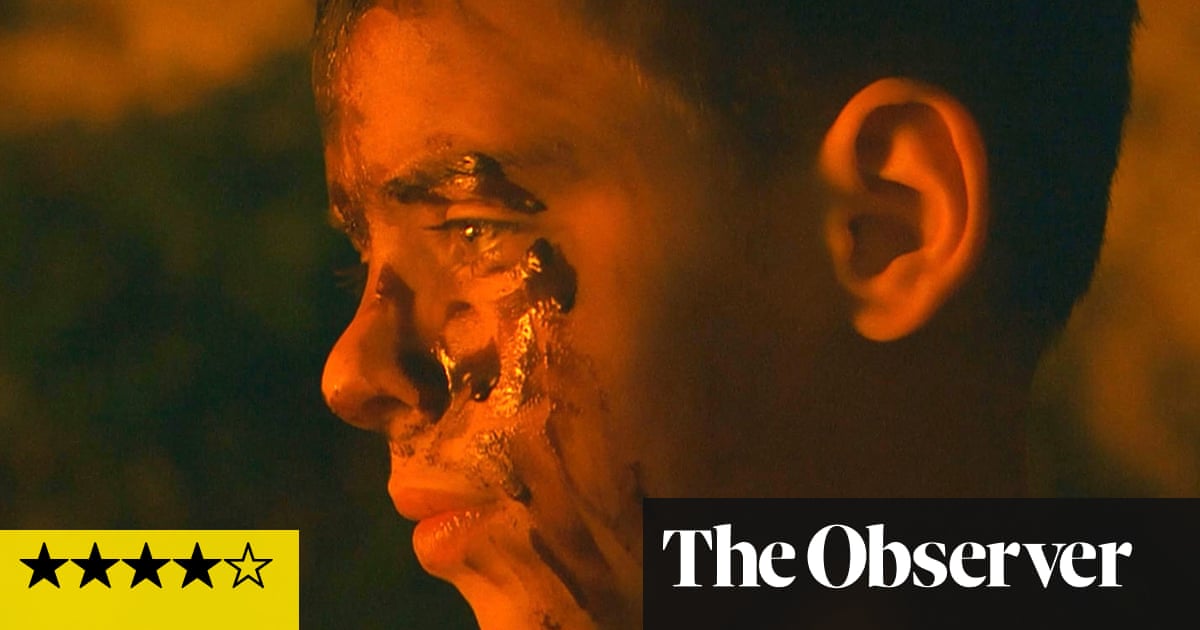
We have been promised a “new kind of Hamlet” with Cush Jumbo’s melancholy prince. While Ian McKellen steered an uneven age-blind version of the play earlier this year, Jumbo’s gender-blind casting in Greg Hersov’s sleek production contains real fireworks and the “blind” casting is all but irrelevant. She cuts an androgynous figure when she first appears in a black suit and mourning band, and is a magnetic force from thereon in. Jumbo’s Hamlet is not so much a hand-wringing antihero as a clear-eyed son, indignant with righteous rage for his murdered father.
She brings teenage energy to Hamlet’s strops, intelligent wit to his feigned madness and shows a shining clarity in the soliloquies, which are delivered with grand, pure power. She sobs as she speaks of her dead father and runs into her mother’s arms, suddenly childlike, with none of the incestuous undertones we often see between Hamlet and Gertrude.
There is superb chemistry between Hamlet and Ophelia, whose first scene together is a kind of salsa dance with music and song, instantly sparking romance and tenderness. Norah Lopez Holden is magnificent as Ophelia, wrenching emotional depth from a thin, flat role. She has a sweet innocence that never seems contrived and we feel her teenage flutterings at Hamlet’s slights as well as her depth of grief for Polonius.
The production makes it abundantly clear that this is a play about family grief, from Ophelia’s unravelling to Laertes’s helplessness at her death, giving us much more than the traditional focus on Hamlet’s mourning alone. The play’s humour is eked out at every availability, from Hamlet’s “madness” (never mannered, full of subtle tics and flecks) to the sparkly-eyed pedantry in Joseph Marcell’s Polonius and there is a freshness to even the most familiar japes and jokes.
Hersov’s vision of Elsinore is a thoroughly contemporary one, though the production feels as if it wavers between faithfulness and irreverence: there are emphatically modern interludes of reggae and rap; Rosencrantz and Guildenstern take giggling selfies and a track-suited Laertes’ (Jonathan Ajayi) delivery carries the cadences of modern-day street talk.
There are no sceptres or crowns in this court, and both Adrian Dunbar’s Claudius and Tara Fitzgerald’s Gertrude seem undercooked. Perhaps it is deliberate, to emphasise the banality of evil, but it makes for disappointingly low-key performances. Dunbar’s Claudius appears less of a king, more a politician in a blue suit who could pass for Superintendent Ted Hastings on gardening leave. Yet much of the play’s political drama is reduced, including Claudius’s plot to have Hamlet killed in England and Hamlet’s counter-plot. Neither does Fortinbras storm the court after the final bloodbath, to show the overhaul of power.
The longer first half zips along, with Nina Dunn’s video design, Aideen Malone’s lighting and the music and Emma Laxton’s sound combining to create the effects of a modern-day thriller. Anna Fleischle’s spare, extraordinary set is all smoke and mirrors, reflecting themes of spying and surveillance. Pillars pivot to hide or reveal, and their changing exteriors seem like a trick of the eye: sometimes modern marble, sometimes gothic stone. King Hamlet appears as an imaginatively conceived apparition of swirling white vapours, so it feels like a disappointment when Dunbar steps out, doubling up as the Ghost – a little like The Wizard of Oz revealed behind the curtain.
The impeccable balance in pacing and tension of the first half begins to wobble in the second and the action feels muted, though Jumbo loses none of her energy. If it is not a perfect production, it is still a remarkable one, with an exceptional Hamlet at its heart.












